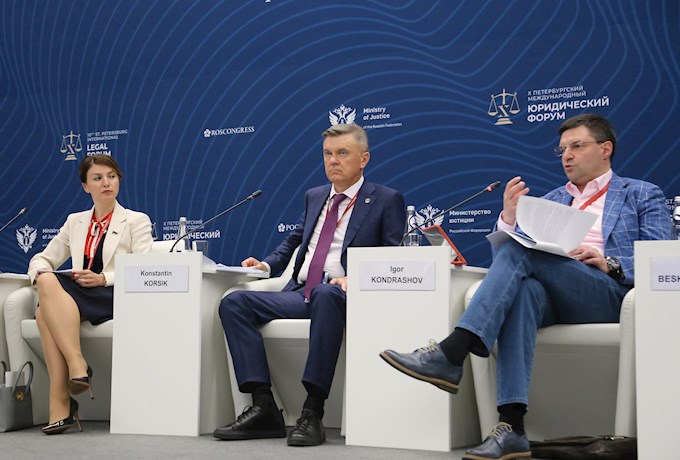Key conclusions
Big data is a new reality for business and state. It is a reality where they could and should work together
“We live in a time when information is the most important resource in our society. Information technology is becoming our permanent way of life. The institution of personal data becomes very important in this society. <...> It [data] is the main asset and the development foundation for modern economy so that it can offer the maximum number of goods and services. Indeed, businesses use personal data to create new products and services, to develop new business models, to form a personalized approach to the consumer. Government agencies use data to improve the quality of public services, to perform their public functions,” Igor Kondrashov, Vice-President - Director of the Legal Department, Sberbank.
“I am an adamant advocate that a person should not waste time obtaining any certificates anywhere. It is not their business. A person's business is simply to live, work, and enjoy life. And all these certificates that must be collected, a person should not see them. This is a matter of interdepartmental cooperation. A vivid example is the payments to children under the age of 7 in a pandemic year. No one in the government asked anyone for any certificates. They simply signed an agreement with Sberbank, and all the money was transferred to the Mir card. This is how the government should work. With the advent of artificial intelligence and with the proper processing of this data this is the new government. There is a new person: no need for moms to collect certificates, all this stuff like the Pension Fund, SNILS, it should all already be prepared, no need to go anywhere,” Maxim Beskhmelnitsyn, Deputy Minister of Justice of the Russian Federation.
“Obviously, the legally significant procedures we are talking about today are progressively moving online. This is an objective reality. Along with the innovations, the legal regulation of civil turnover is changing, and there is a need to protect the rights of citizens and businesses, taking into account these new formats,” Konstantin Korsik, President, Federal Notary Chamber.
“We all want businesses to develop, to offer us more personalized services. Let us look at this as a triangle, where each of the three sides represents a different sphere: the individual, the business, and the government. The individual needs services, the business needs relevant data that it will offer in a timely, responsive, and agile manner. <...> The goal for the state is to find a balance between the individual and business,” Irina Pankina, Deputy, First Deputy Chairman of the Committee on State Building and Legislation, State Duma of the Federal Assembly of the Russian Federation.
In order to develop efficiently the industry needs to differentiate personal and impersonal data
“I would divide big data into two big components, personal data and other data. By other data, I mean essential things like climate change over the past 20 years. This data should be in the public domain. As for personal data we are trying to get into private life, so we should not give it to everyone, much less to business <...> We know that businesses are going to take this data and hire a couple of smart data scientists, they will write a neural network and, as they say, "sell" their product. Is this fair? I do think so,” Maxim Beskhmelnitsyn, Deputy Minister of Justice of the Russian Federation.
“The first thing we have to do... is simply to separate the two different entities: personal data and depersonalized data. Once we separate them, we must clearly define a legal regulatory regime for each, given all the problems that arise,” Elina Sidorenko, General Director, Platform for Working with Entrepreneurs’ Enquiries; Director of Centre for Digital Economy and Financial Innovation, MGIMO University.
“In fact, when we talk about big data today, we have not yet settled the conceptual level of these categories, neither big data itself, nor big data in general as a category,” Alexey Minbaleev, Head of the Department of Information Law and Digital Technologies, Kutafin Moscow State Law University (MSAL).
PROBLEMS
Citizens are unaware of their rights in data processing, consumer culture is frequently simply is not there
“We all fill out an endless amount of paperwork almost every day. There is something written in small print, signed at the bottom, and there could be ten papers, eight, twelve of them, whether you are buying a hairdryer, going to the hospital, or going to the bank. It is a gigantic amount, and people often do not understand what they are signing, who they are giving this data to, and which organizations store this data,” Igor Kondrashov, Vice-President - Director of the Legal Department, Sberbank.
“One of the problems we are talking about today is largely due to a very low culture of processing, handling, and understanding of personal data by our citizens. Much of the reason for this is that when the law On Personal Data was passed in 2006, it was totally unexpected. It came into force almost immediately, without any preparation that should have been done prior to its adoption and enactment,” Alexey Minbaleev, Head of the Department of Information Law and Digital Technologies, Kutafin Moscow State Law University (MSAL).
“Experts from the Higher School of Economics conducted an interesting study on the population's demand for digital technology, which showed that people increasingly afraid [to leave – Ed.] their personal information anywhere. The majority of users, nearly 84%, feel absolutely powerless against the growing risks of losing control over their data online, with more than half admitting that they cannot protect themselves against information theft. And the majority of respondents – that's more than 70% – do not want to leave their data online under any circumstance,” Irina Pankina, Deputy, First Deputy Chairman of the Committee on State Building and Legislation, State Duma of the Federal Assembly of the Russian Federation.
“The vast majority of citizens regularly leave their data online without thinking about the risks. Consent to the processing of personal data is essentially given automatically; almost no one reads the multi-page text of the attached document in order to quickly obtain the required service. If in small routine operations like ordering a cab or having something delivered from an online store, this situation does not entail any particular risks. As for the more serious transactions involving real estate or the sale of business assets, the risks are enormous,” Konstantin Korsik, President, Federal Notary Chamber.
Unscrupulous businesses often abuse the legal ignorance of citizens
“Often times, we cannot buy a product or a service without giving consent to the processing of personal data, even though it is completely illegal in fact. It is one thing to sign something in a store, but now many products and services are sold electronically, and if you do not check the box in the right place, you just cannot get through. This also limits the rights of citizens, in my opinion,” Igor Kondrashov, Vice-President - Director of the Legal Department, Sberbank.
“So far we have this situation where you go to a mall or somewhere else, and they give you a piece of paper and tell you that unless you sign here, you cannot buy a hair dryer. And the signature says exactly that you give your consent to the processing of personal data,” Maxim Beskhmelnitsyn, Deputy Minister of Justice of the Russian Federation.
“Often when a person enters into a contract, one way or another personal data processing conditions are imposed, and those conditions are not directly related to the subject of the contract,” Irina Pankina, Deputy, First Deputy Chairman of the Committee on State Building and Legislation, State Duma of the Federal Assembly of the Russian Federation.
SOLUTIONS
Personal data processing should become transparent for everyone involved
“I would like to see a scenario, where if a citizen gives away data, then he or she can follow how this data is used. Otherwise, it is not fair, because you have given the data to a business or the government, they use this data, and you do not know what they do with it. But when a person knows what they are doing with it, he or she will be more responsible and think: "Sure, I gave the data, yes, but in return I will get new digital services" for example,” Maxim Beskhmelnitsyn, Deputy Minister of Justice of the Russian Federation.
“It is necessary to create a certain system for storing data on consents to the use of personal data, a kind of unified platform where people can go and see who they have consented to and which organizations are currently processing this data. I think that this should be one cloud, where each person could look at what data they have left about themselves and where,” Igor Kondrashov, Vice-President - Director of the Legal Department, Sberbank.
“Our new bill is aimed primarily at ensuring this transparent mechanism for processing personal data, as well as strengthening and establishing liability for the cross-border transfer of personal data. What do we propose to do to solve this problem? First of all, operators will have an additional obligation to notify Roskomnadzor of data leaks and conduct their own internal investigations. Now the operators are not obliged to do this, so in fact there is no quality cooperation between the operators and the state system. Also, the response time of operators to requests from a citizen or Roskomnadzor is almost three times shorter,” Irina Pankina, Deputy, First Deputy Chairman of the Committee on State Building and Legislation, State Duma of the Federal Assembly of the Russian Federation.
For more information, visit the Roscongress Foundation’s Information and Analytical System at roscongress.org






